When a Chiari woman passes away it changes so much for so many.
 It leaves a hole in the hearts of the Chiari community because, even as dysfunctional as we are sometimes, we know we’re all in this together!
It leaves a hole in the hearts of the Chiari community because, even as dysfunctional as we are sometimes, we know we’re all in this together!
- We know what it’s like to have conditions that so few understand, including our doctors.
- We know how humiliating it is to watch our bodies change and our muscles deteriorate as we fight just to hold up our heads, even for just a few hours a day.
- We know what it’s like to have our symptoms and pain consistently dismissed as psychosomatic.
- We know what it’s like for doctors to say how easy the surgery will be only to find out that they had no clue of what they were talking about.
- We know the heartbreak we feel when those we love the most choose to believe our doctors instead of us.
- We know what it’s like to be told that the surgery cured us, while everything in our heads and necks seemingly rebel in disagreement.
- We know what it’s like to have to fight for every aspect of our treatment, from imaging to specialist, and still have help denied to us.
- We know what it’s like to have to find strength through the pain each day and still try and carry on the best that we can for those that we love so much. We long more than anything to get back to who and what we once were. To run and jump and enjoy life with those we love most, but the pain is too overwhelming. The truth is that those times that we did try left us in even more pain; so, we are forced to learn to choose what we do wisely.
- We know the genetic nature of what we have, even if our doctors don’t, and we all long to figure it all out and fix this very broken medical system that relies on information that is centuries old, before our children and their children are forced to face what we face.
- We know what it’s like to live in fear of leaving all those we love, as they are our reason for living.
It leaves a hole in the hearts of her family that should be respected.
To them she is so much more than a Chiari Woman, she is my wife, my mother, my daughter, my grandma, my sister, my aunt, and the love of my life.
Chiari didn’t just rob their loved one, it’s robbed the entire family for years.
They too have longed for what was and often cried behind closed doors for all that likely would never again be.
 Her husband has had days where he was so petrified at the thought of losing her. Sometimes that fear manifested as anger and frustration, but it wasn’t her that he was really mad at; He was mad at the Chiari that was taking his wife from him. He regretted those words from the very minute that he gazed upon her eyes as she heard them. He couldn’t make her forget those words, they pierced her soul too deeply, so he internally committed to just try and show her why he loves her. Despite his frustrations with the situation, he admired this amazingly strong woman who was facing more pain than he could ever understand. He’s cried out to God privately for this soul mate that he committed to so many years ago. He feared losing her and he did not know how he could ever hold everything together like she did, but he had to try because there was so much was on his shoulders. He never talked much about the weight he carried in it all, because he knew what she was facing was already more than she could handle. So, he learned to grieve as silently as he could – to understand what he could, to empathize as he could, to remain as strong for her and the family as best as he could.
Her husband has had days where he was so petrified at the thought of losing her. Sometimes that fear manifested as anger and frustration, but it wasn’t her that he was really mad at; He was mad at the Chiari that was taking his wife from him. He regretted those words from the very minute that he gazed upon her eyes as she heard them. He couldn’t make her forget those words, they pierced her soul too deeply, so he internally committed to just try and show her why he loves her. Despite his frustrations with the situation, he admired this amazingly strong woman who was facing more pain than he could ever understand. He’s cried out to God privately for this soul mate that he committed to so many years ago. He feared losing her and he did not know how he could ever hold everything together like she did, but he had to try because there was so much was on his shoulders. He never talked much about the weight he carried in it all, because he knew what she was facing was already more than she could handle. So, he learned to grieve as silently as he could – to understand what he could, to empathize as he could, to remain as strong for her and the family as best as he could.
 Her children have learned to grieve in silence as well. They learned to face life and all the obstacles they faced without making waves at home. How could they? They saw the pain that flared when things had stressed her in the past. They didn’t want to cause that again. They longed having the mom that they used to have, the mom with the strength to climb every mountain with them, the mom that made every challenge in life seem conquerable. They admired her strength and never understood how they could admire so much in her yet hate the fact that she wasn’t always there for them anymore. Even when she so desperately tried to be there the brain fog often dominated and took over the conversation entirely, this conversation that she probably wouldn’t remember for long. They resented her for it but knew that it wasn’t her fault. Like everyone else that loved her the most, they said so many things that they regretted. They knew that they often came across like they hated her, but the real truth was there was no one in the world that they longed for more. They’ve always hated seeing her in pain, yet her pain served as a constant reminder of the future that they feared in their future. They remember when she told them about the hereditary nature of the genes passed on to them, with tears in her eyes. Would they have what she had? Would they become as symptomatic? Would they have the courage to fight it as valiantly as she did? Should they have children one day? The reasons for concern were endless.
Her children have learned to grieve in silence as well. They learned to face life and all the obstacles they faced without making waves at home. How could they? They saw the pain that flared when things had stressed her in the past. They didn’t want to cause that again. They longed having the mom that they used to have, the mom with the strength to climb every mountain with them, the mom that made every challenge in life seem conquerable. They admired her strength and never understood how they could admire so much in her yet hate the fact that she wasn’t always there for them anymore. Even when she so desperately tried to be there the brain fog often dominated and took over the conversation entirely, this conversation that she probably wouldn’t remember for long. They resented her for it but knew that it wasn’t her fault. Like everyone else that loved her the most, they said so many things that they regretted. They knew that they often came across like they hated her, but the real truth was there was no one in the world that they longed for more. They’ve always hated seeing her in pain, yet her pain served as a constant reminder of the future that they feared in their future. They remember when she told them about the hereditary nature of the genes passed on to them, with tears in her eyes. Would they have what she had? Would they become as symptomatic? Would they have the courage to fight it as valiantly as she did? Should they have children one day? The reasons for concern were endless.
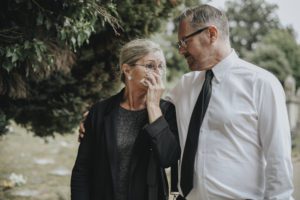 Depending on when she became symptomatic, her parents have likely spent endless days and nights in hospitals and emergency rooms. They’ve spent years learning all they could and even learned to recite her diagnoses with detailed explanations because they’d became so accustomed to these conditions that so few doctors could pronounce, much less treat. For years they made sure to always have her complete medical chart in hand with official documentation, in case they were challenged by a medical professional or anyone dared to call their daughter “a drug seeker” or “psychosomatic.” They spent countless hours trying to dull the tortuous pain they saw her go through, and spent many more hours researching creative home remedies to give her a sense of relief, even if it was only momentary. There were times they prayed for God to just go ahead and take her, so she wouldn’t be in anymore pain; and then felt guilty for even thinking it. Then one day the screaming stopped, the pain was gone, but with it so went their daughter.
Depending on when she became symptomatic, her parents have likely spent endless days and nights in hospitals and emergency rooms. They’ve spent years learning all they could and even learned to recite her diagnoses with detailed explanations because they’d became so accustomed to these conditions that so few doctors could pronounce, much less treat. For years they made sure to always have her complete medical chart in hand with official documentation, in case they were challenged by a medical professional or anyone dared to call their daughter “a drug seeker” or “psychosomatic.” They spent countless hours trying to dull the tortuous pain they saw her go through, and spent many more hours researching creative home remedies to give her a sense of relief, even if it was only momentary. There were times they prayed for God to just go ahead and take her, so she wouldn’t be in anymore pain; and then felt guilty for even thinking it. Then one day the screaming stopped, the pain was gone, but with it so went their daughter.
As Chiarians, we all deal with thoughts of death more than “normal” people and “normal” families. We go from surgery to surgery knowing that this might be the surgery that ends our fight altogether, yet we hold on to hope that it will be the surgery that helps us to be all that we’ve yearned to be once again. Our community has found strength in our unity. As we remember those we’ve lost and face our fears about our morbidity, let us continue to unite to change this for us and our future generations that we love so much.
*This article is dedicated to all the Chiari Angels and their families, as well as those that are still fighting the fight. Hold your families close; forgive quickly and as often as necessary. We never know how much time we have and we usually never really know how much we’re truly loved until it’s too late.
**Note: This article was not to leave out all of our valiant Chiari brothers fighting the fight, it was just easier to write from one point of view.
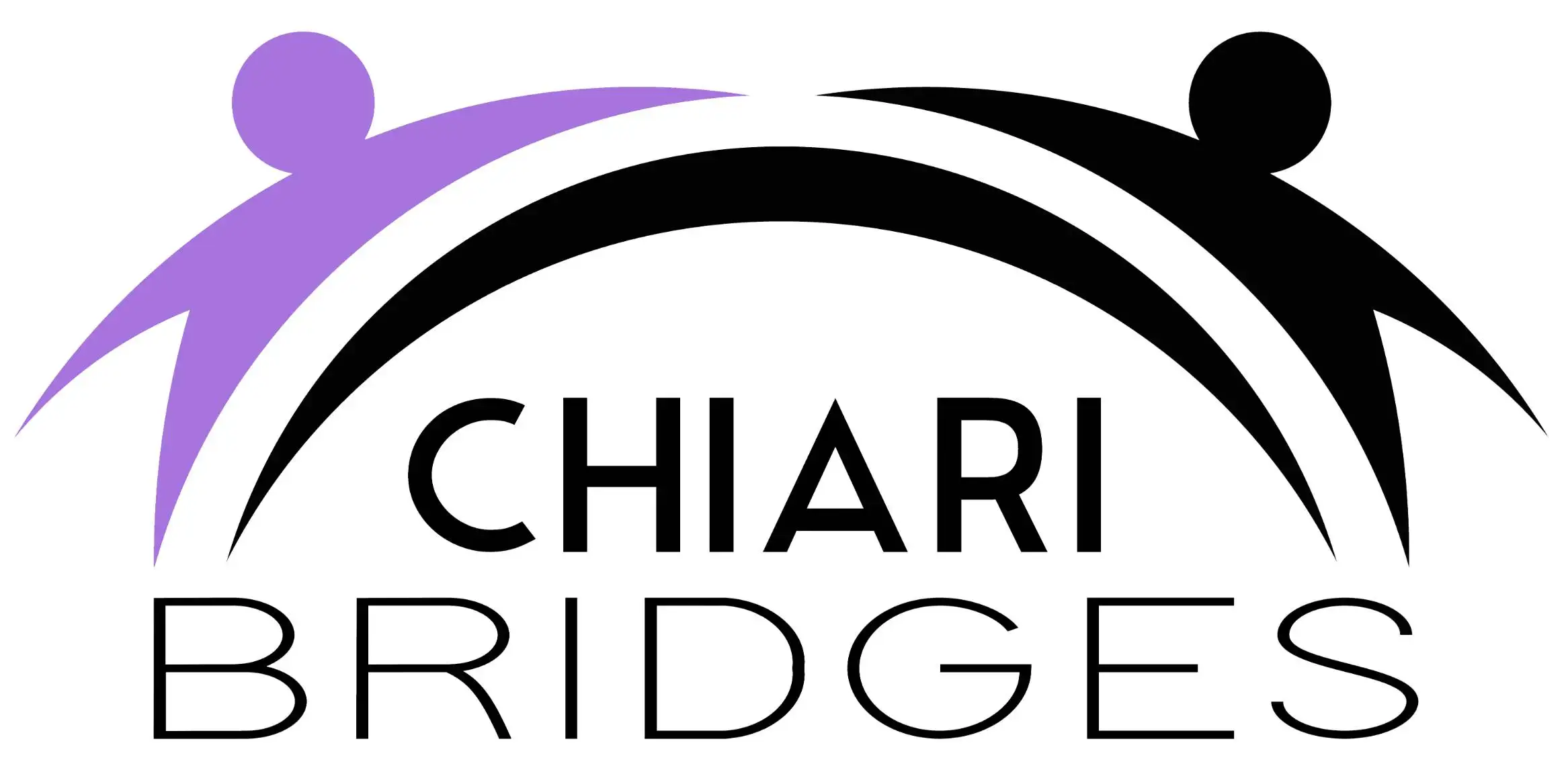

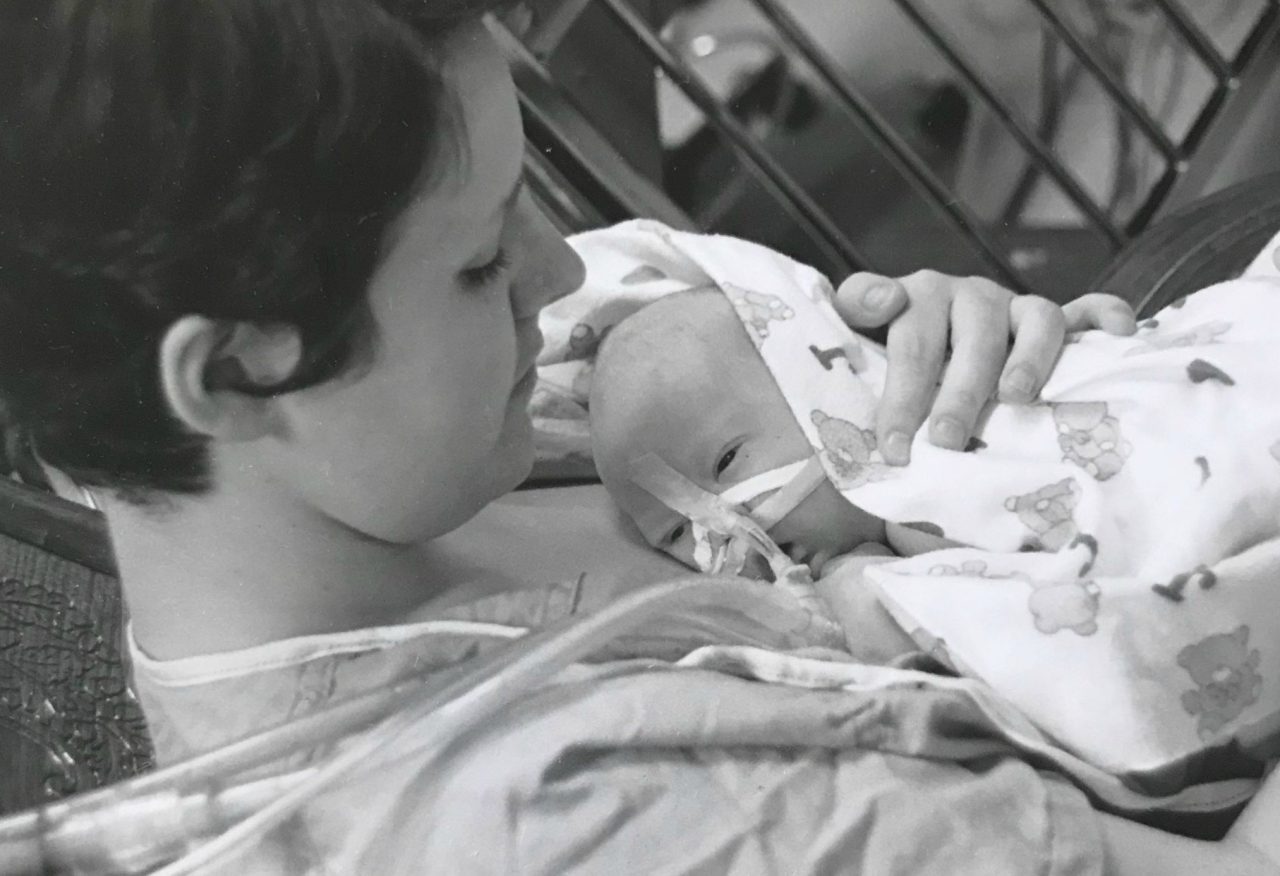
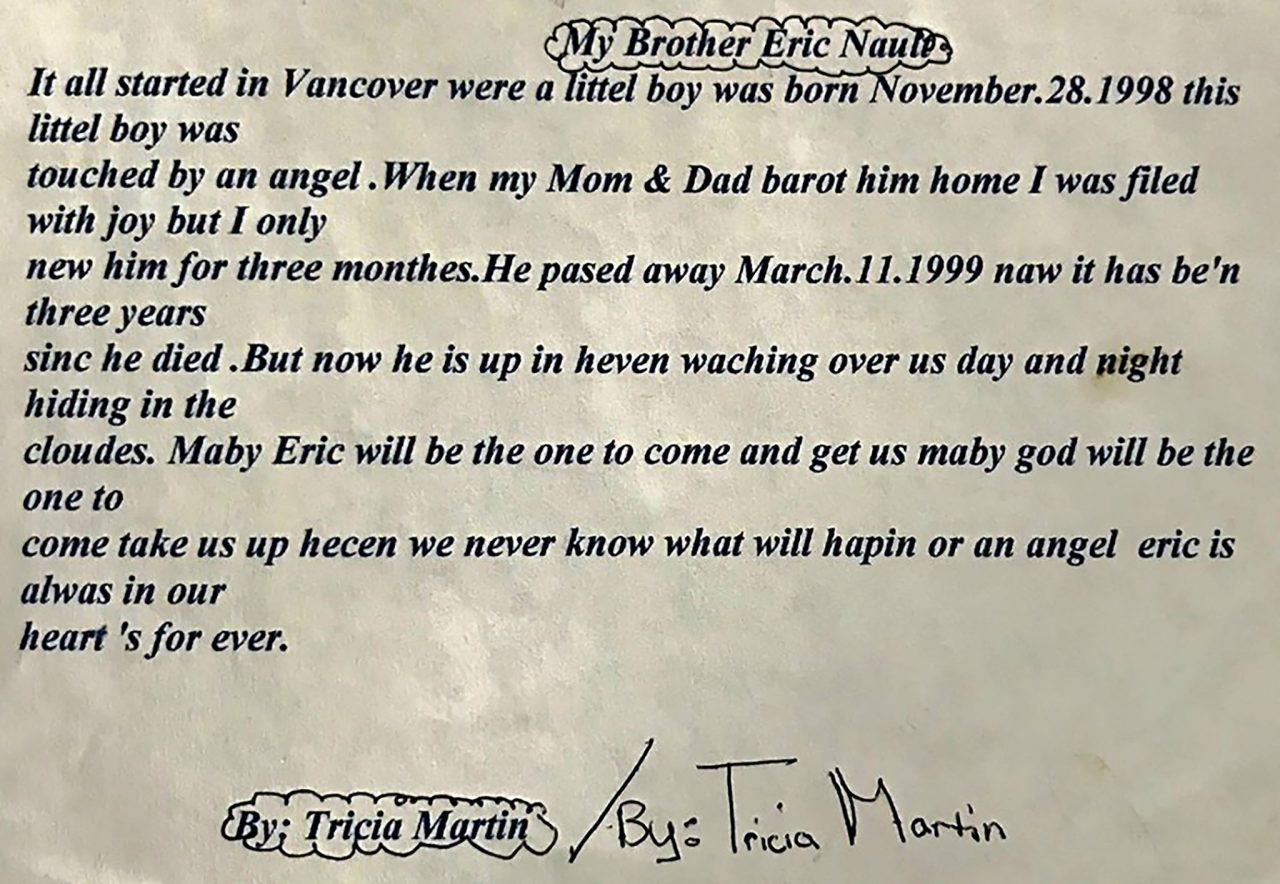
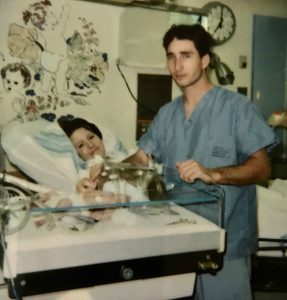 After several hours I regained consciousness, family and doctors surrounded me trying to explain what they knew about baby Eric. They explained Eric and I would have to be immediately flown out to a larger center where they could properly care for my baby. Eric couldn’t support his own airway, he couldn’t suck, swallow, or move due to hypertonic muscles. He was having several seizures, all pointed to brain damage. At this point they had no idea what was wrong and could not conclude whether my baby would live. I recall saying I wanted to go see my baby and trying to get up out of the hospital bed, but the nurses told me I couldn’t see him, because I had just gone through a major surgery and he was too sick; we both had to rest for transport. When the nurses told me that, I flipped, telling them that come hell or high water, I was going to see him. I got as far as swinging my legs over the bed before I vomited everywhere. The nurses finally clued in that I was going with or without their help, so they laid me back down and wheeled me to the NICU to see him. I couldn’t even see my baby for he was so small and leads encased his body where he layed. They had his chin strapped up as every time it fell backward it would close off his airway leading to oxygen desaturation. They didn’t have the resources to intubate a baby at this hospital, so they decided to fly us out to Vancouver Children’s Hospital.
After several hours I regained consciousness, family and doctors surrounded me trying to explain what they knew about baby Eric. They explained Eric and I would have to be immediately flown out to a larger center where they could properly care for my baby. Eric couldn’t support his own airway, he couldn’t suck, swallow, or move due to hypertonic muscles. He was having several seizures, all pointed to brain damage. At this point they had no idea what was wrong and could not conclude whether my baby would live. I recall saying I wanted to go see my baby and trying to get up out of the hospital bed, but the nurses told me I couldn’t see him, because I had just gone through a major surgery and he was too sick; we both had to rest for transport. When the nurses told me that, I flipped, telling them that come hell or high water, I was going to see him. I got as far as swinging my legs over the bed before I vomited everywhere. The nurses finally clued in that I was going with or without their help, so they laid me back down and wheeled me to the NICU to see him. I couldn’t even see my baby for he was so small and leads encased his body where he layed. They had his chin strapped up as every time it fell backward it would close off his airway leading to oxygen desaturation. They didn’t have the resources to intubate a baby at this hospital, so they decided to fly us out to Vancouver Children’s Hospital.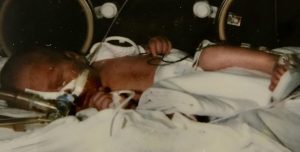 begging, pleading to God for your child to be healed. After 3 weeks they finally let me have skin to skin cuddles and started teaching us how to care for him. This isn’t the way it’s supposed to go; you’re supposed to go to the hospital, have a baby and take them home, right? Instead you walk around numb, you don’t remember the last time you ate, or showered, you just feel like you’re having an out of body experience, as if you’re watching this happen to someone else. You’re scared to leave their side for even a minute because what if it’s that minute that he leaves this world and you’re not there?
begging, pleading to God for your child to be healed. After 3 weeks they finally let me have skin to skin cuddles and started teaching us how to care for him. This isn’t the way it’s supposed to go; you’re supposed to go to the hospital, have a baby and take them home, right? Instead you walk around numb, you don’t remember the last time you ate, or showered, you just feel like you’re having an out of body experience, as if you’re watching this happen to someone else. You’re scared to leave their side for even a minute because what if it’s that minute that he leaves this world and you’re not there?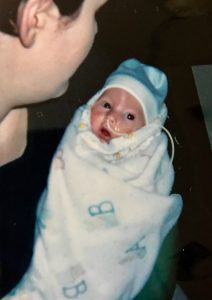 After about a month we had a meeting, and it was then that the doctors told us we had a failure to thrive baby, his cells didn’t migrate to the right place at the right time, that his
After about a month we had a meeting, and it was then that the doctors told us we had a failure to thrive baby, his cells didn’t migrate to the right place at the right time, that his 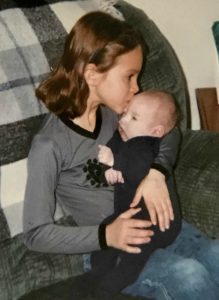 Within 2 weeks, it was clear this child was a strong fighter and wasn’t ready to give up quite yet. We had another meeting and it was decided we would take him home. We wanted his big sister to have time with him and show him what a home was like. We took a 2-week crash course on neonatal nursing. We had to learn how to do his lung physio, how to suction him, and how to work a feeding pump and so much more. Eric was brought home February 10,1999. We did his 24-hour care until March 9th when he took a turn for the worse. He was diagnosed with
Within 2 weeks, it was clear this child was a strong fighter and wasn’t ready to give up quite yet. We had another meeting and it was decided we would take him home. We wanted his big sister to have time with him and show him what a home was like. We took a 2-week crash course on neonatal nursing. We had to learn how to do his lung physio, how to suction him, and how to work a feeding pump and so much more. Eric was brought home February 10,1999. We did his 24-hour care until March 9th when he took a turn for the worse. He was diagnosed with 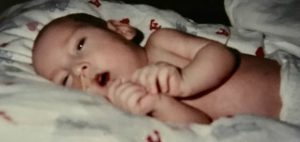 remember very little. I was deeply depressed but I knew I had to keep moving forward for my daughter, she needed me. I know she was hurting too but I was so consumed with my own grief, that I couldn’t reach out to her, I couldn’t handle both her grief and mine. My daughter and I have had to take a lot of time since to heal together. With that being said, the pain of losing a child is not something that you can run away from or attempt to forget; I relive my sons small time on this earth every single day.
remember very little. I was deeply depressed but I knew I had to keep moving forward for my daughter, she needed me. I know she was hurting too but I was so consumed with my own grief, that I couldn’t reach out to her, I couldn’t handle both her grief and mine. My daughter and I have had to take a lot of time since to heal together. With that being said, the pain of losing a child is not something that you can run away from or attempt to forget; I relive my sons small time on this earth every single day.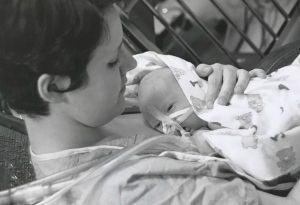
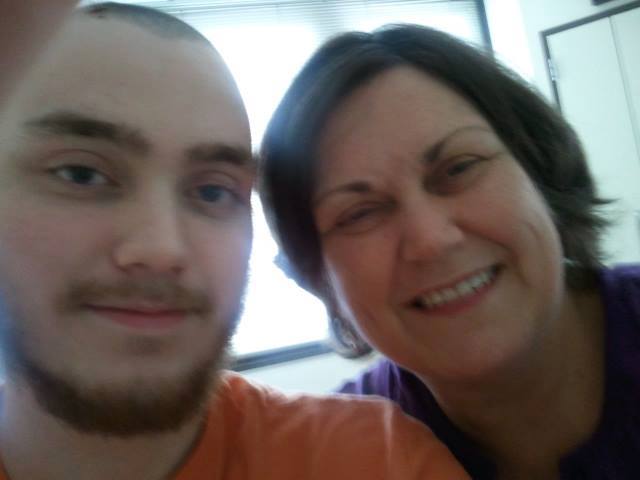
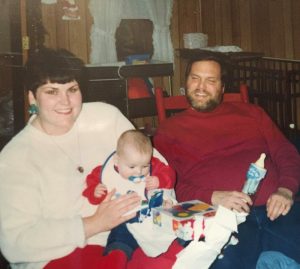 Zona McGee was blessed with a vibrant and beautiful little boy on July 2nd, 1993. She named him Ryan Andrew and fell in love with his sweet face the second she first held him. He looked just like her! Her husband, Kevin, and daughter Crystal, eight-years old at the time, were over the moon as well.
Zona McGee was blessed with a vibrant and beautiful little boy on July 2nd, 1993. She named him Ryan Andrew and fell in love with his sweet face the second she first held him. He looked just like her! Her husband, Kevin, and daughter Crystal, eight-years old at the time, were over the moon as well.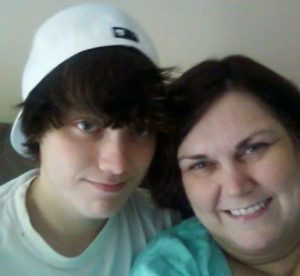 Ryan was a good student and took a local job after graduating from high school. He loved working and earning his own money. By all accounts, Ryan was a completely normal, functioning, and on-target, young adult. He was doing what most recent high school grads do – living life, having fun, and trying to decide what profession he might go into.
Ryan was a good student and took a local job after graduating from high school. He loved working and earning his own money. By all accounts, Ryan was a completely normal, functioning, and on-target, young adult. He was doing what most recent high school grads do – living life, having fun, and trying to decide what profession he might go into.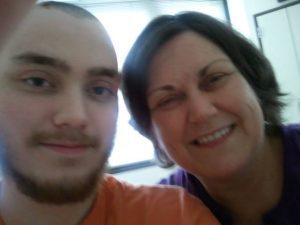 Over the next few months, Ryan was rushed to the E.R. on several occasions due to cyclic, intractable, vomiting along with severe head and neck pain. During these dozen-plus visits to the E.R., he was turned away multiple times and labeled “drug-seeking, weak, and dramatic.” This was a slap in the face, as Ryan was advised to blindly have the surgery to prevent him from returning to the E.R. This painful irony was not lost on Zona, and it only added to her trauma and confusion.
Over the next few months, Ryan was rushed to the E.R. on several occasions due to cyclic, intractable, vomiting along with severe head and neck pain. During these dozen-plus visits to the E.R., he was turned away multiple times and labeled “drug-seeking, weak, and dramatic.” This was a slap in the face, as Ryan was advised to blindly have the surgery to prevent him from returning to the E.R. This painful irony was not lost on Zona, and it only added to her trauma and confusion.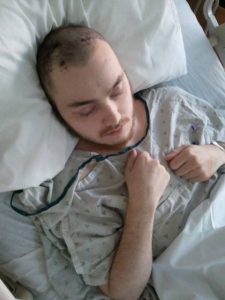 On the last visit to this particular hospital, the chief
On the last visit to this particular hospital, the chief